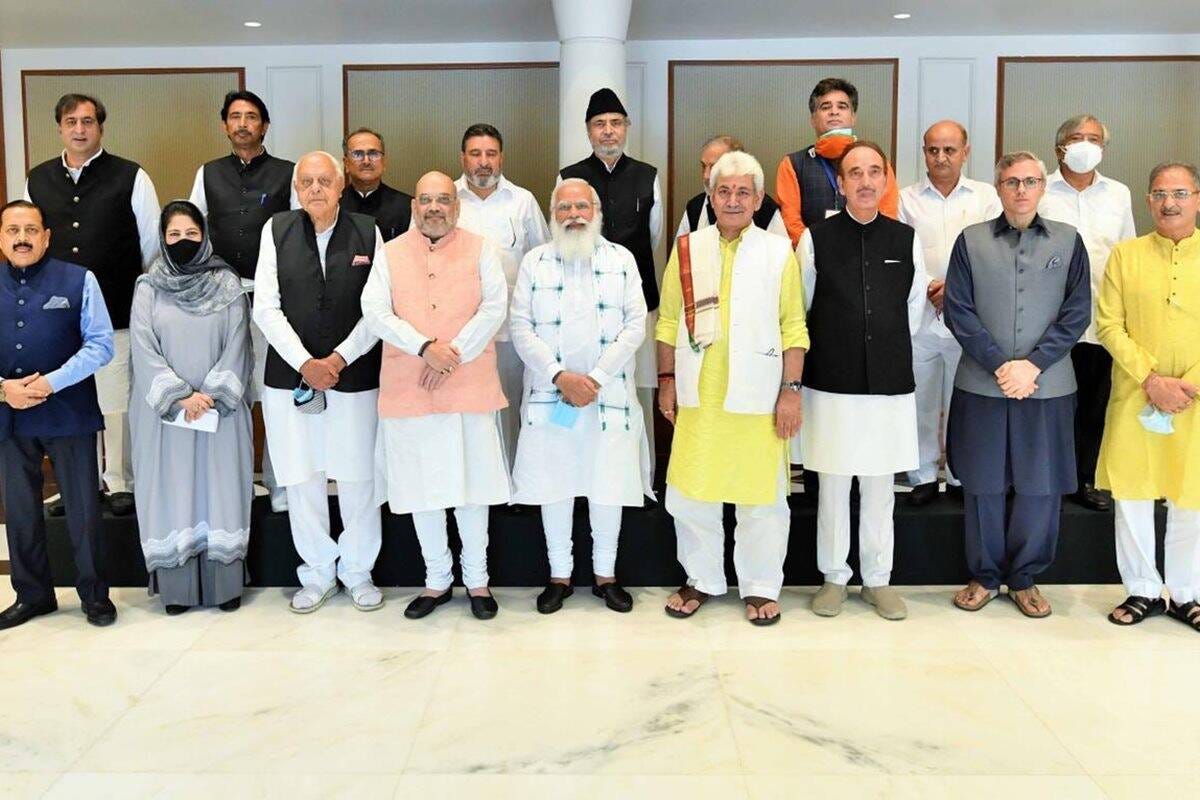Hello
Hope you are doing well and staying safe. This week we talk about a recent study by Pew Research Centre on religious tolerance in India, events at J&K meeting and the heatwaves in Canada and India. Lastly, we have a book review by on of our reader- Afreen Alam.
How religiously tolerant is India?
Conversations around religion, identity and politics have always remained a point of contention among the citizens of India, even when secularism and diversity are highlighted constitutional values. Pew Research Centre recently conducted a survey ‘Religion in India: Tolerance and Segregation’
The centre interviewed 30,000 people across India in 17 languages, which revealed some interesting insights:
The survey highlights the fact that many Hindus believe that to be a true Indian, it is important to be a Hindu. On other hand, 95 per cent of the Muslim respondents shared they were very proud to be Indian and 85 per cent agreed with the statement: “Indian people are not perfect, but Indian culture is superior to others.”
As per the survey, people in all six major religious groups(Hindus, Muslims, Christians, Sikhs, Buddhists and Jains) believe that respecting each other’s religion is very important but on the contrary, they do not prefer their neighbour to be of some other religion.
Despite being religiously tolerant 84% of Indians feel it is very important to respect all religions, but many oppose interfaith marriages in India.
The partition is viewed by different religions differently, as Sikhs and Muslims view it as not a good thing and at least 43% of Hindus felt that partition was beneficial for Hindu-Muslim relations.
As per the study, despite sharing certain commonalities in beliefs and values, India’s major religions often don't feel they have much in common. The citizens of India, even after knowing how to coexist with each other’s religion, do not feel safe in their own country. Why do you think these differences persist and how do we overcome them?
(Sources: Indian Express, BBC, Pew Research Centre)
Jammu and Kashmir
Nearly after two years of revoking the special constitutional status of Jammu and Kashmir (J&K) under Article 370 ( which gave J&K special provisions and a certain amount of autonomy) of the constitution, the Government of India met the regional political parties of J&K on 24th June 2021.
The agenda of the meeting:
To strengthen the grassroots democracy in J&K.
To focus on redrawing the boundaries of an assembly or Lok Sabha constituency in J&K
Let’s know more about the Delimitation (redrawing of the boundaries of an assembly or Lok Sabha constituency)
Before Article 370 was revoked- J&K’s Lok Sabha seats were governed by the Constitution of India and that of assembly seats, by the Jammu and Kashmir Constitution.
After- The GOI is focusing on delimitation as both Lok Sabha and assembly seats are to be demarcated under the Constitution of India. As per the J&K Reorganisation Act of 2019, the new legislature in J&K will have 90 seats, seven more than the previous assembly, after the constituencies are demarcated afresh.
The three key discussion points:
Delimitation of J&K- Delimitation Commission of 2020, will visit and meet political party members of J&K as redrawing the boundaries is directly linked with the representation of Muslim and Hindu dominated regions which will help the parties to strengthen their base.
Assembly elections- The GOI stated that assembly elections will happen, but soon after the demarcation of boundaries in J&K is completed.
Statehood and J&K- Leaders of J&K raised the demands of restoring the statehood for J&K before the assembly elections.
What will happen after the boundaries are redrawn?
The seats of Lok Sabha and Rajya Sabha are expected to increase from 543 to 888 and from 245 to 384, respectively.
(Sources: NDTV, The Print, India Today)
Open your eyes- It’s Climate Change!
Do we need any other evidence of accepting that climate change is real? And It’s happening?
Lytton, a town in British Columbia, broke Canada’s all-time hottest temperature record three times. The current temperature is 49.6 degrees Celsius, as of 29th June 2021. The impact of this increment in temperature led to the death of some 486 people which is said to have increased by 193%. As per the officials, many of them are suspected to be killed by heatwaves.
In other corner of the world- India’s capital, Delhi experienced the first heatwave of 2021, with a record-breaking temperature of 43.1 degrees Celsius. Moreover, the temperature in several parts of Delhi even reached 44.4 degrees Celsius.
Expert says: Michael E Mann, professor of atmospheric science and the director of the Earth System Science Center, in a New York Times column- said that the heatwaves are occurring three times more as they did in the 1960s along with record-breaking hot months occurring five times more often than they would be expected without global warming.
Now the question arises, what is a heatwave and what will be its impact in the coming future?
The phenomenon occurs when the high pressure in the atmosphere moves in and pushes warm air toward the ground. That air warms up further as it is compressed, and we begin to feel a lot hotter. However, when we assess the impacts of heatwaves, they go beyond our imagination-
Economic Impact: The heatwaves exacerbate economic inequalities as poor people do not get access to coolers, AC, etc.
Reduced Work Productivity: There is reduced work productivity during heat waves which lead to a loss of 2% of the working hours globally, every year.
Shortage of Essentials: The heatwaves impact the availability of water and electricity.
Lower Standards of living: A World Bank report suggests that by 2050, about 600 million Indians will live in places that could experience a loss of living standards.
(Sources: BBC, India Today, Future Earth)
What else is happening?
The United Nations on 1st July recorded a new record high temperature for the Antarctic continent, confirming a reading of 18.3 degrees Celsius (64.9 degrees Fahrenheit) which was made last year.
The social media giant- Facebook removed over 30 million content pieces across 10 violation categories from May 15 to June 15, in compliance with the new IT Rules of India which came into force on 26th May 2021.
The Tamil Nadu government has announced the formation of a new economic council which will include Esther Duflo -Nobel Laurate, Raghuram Rajan - Former RBI Governor, Arvind Subramaniam- Former Chief Economic Advisor and Jean Dreze- Social Scientist, welfare economist and activist. The purpose of the council is to mitigate economic challenges and boost growth.
Jane Goodall, a renowned primatologist and naturalist, in an interview with Bloomberg, shared that given the Covid-19 pandemic that humanity will be finished if we fail to change the way our food systems work. We brought this pandemic on ourselves by disrespecting animals and nature.
Voices of PolicyFide
Afreen Alam, a researcher and writer, who’s pursuing B.A.LL.B (Hons) from the Faculty of Law from Jamia Millia Islamia, writes about her weekend read~
Indian Summer - The Secret History of the End of an Empire
The Indian Summer chronicles the compelling years before and right after the Indian independence. The transfer of power from the British Government to the governments of newly independent India and Pakistan is considered to be one of History’s greatest yet one of the most tragic events, that saw a partition of British India into two countries and left millions of people in distress. The focus of the book is mainly on 5 major players: MK Gandhi, Jawaharlal Nehru, MA Jinnah, Lord Mountbatten and Edwina Mountbatten. It takes a look at their public and private lives and how their interrelationships transformed the subcontinent. The book gives a detailed and often private account of the above-mentioned people, their early lives, political beginnings, personal relationships and finally their important role in the independence movement.
What makes it an engrossing read is that the historical events that took place are narrated like a novel with constant twists and turns. The author tells a gripping tale about the politicians as well as the normal people of the time. The book mentions the horrors of the partition on both sides of the border. It covers the Kashmir issue with all its complications, it also covers the accession issues of other princely states, like Hyderabad. The book is extensively researched and well written. It is a solid debut for British author Alex von Tunzelmann, she is unbiased and not hindered by nostalgia that is seen in the works of other Britisher writers.
Share what you are reading with us, or any thoughts you have about current events and happenings! Write to us- thepolicyfide@gmail.com
If you want to know more about our research- follow us on Instagram and LinkedIn.
If you liked the newsletter, go ahead and share it with your friends. We believe word of mouth is the best method to grow, and we look forward to your support.








